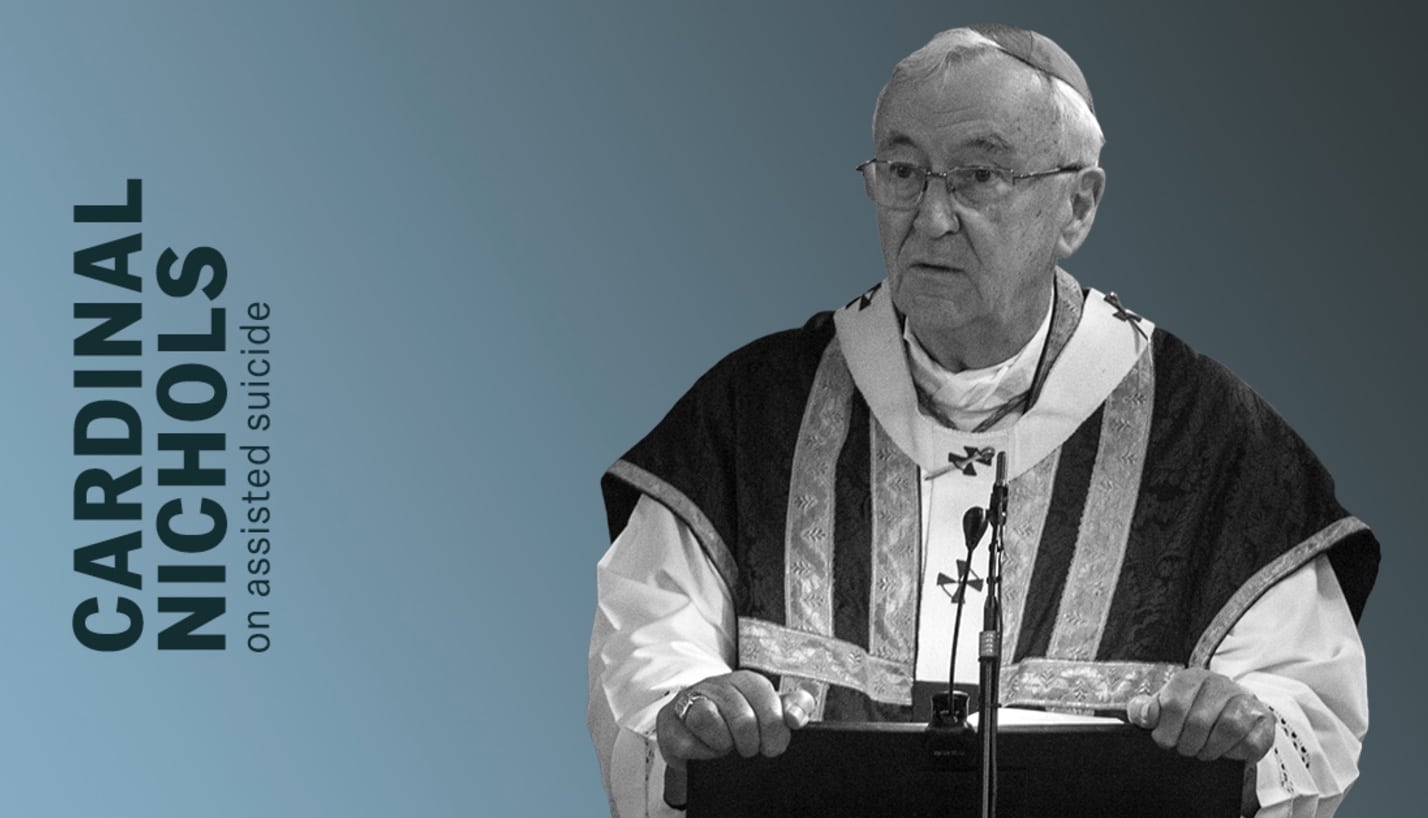Cardinal Vincent Nichols has again spoken out on the “deeply flawed process ” occurring in pushing assisted suicide legislation and of the risk of turning the UK's National Health Service (NHS) into a "National Death Service".
His comments come as the UK parliament prepares to have its final vote on legalising assisted suicide. The Terminally Ill Adults (End of Life) Bill is currently making its way through the Committee Stage in parliament; the sponsor Member of Parliament (MP), Kim Leadbeater, has asked for a series of amendments concerning the role of doctors and the reporting of assisted suicides.
“As I have made clear earlier in this debate, as Catholics we have maintained a principled objection to this change in law recognising that every human life is sacred, coming as a gift of God and bearing a God-given dignity,” said Nichols, the archbishop of Westminster and the President of the Catholic Bishops’ Conference of England and Wales.
“We are, therefore, clearly opposed to this Bill in principle, <mark style="background-color:rgba(0, 0, 0, 0)" class="has-inline-color has-vivid-cyan-blue-color"><a href="https://thecatholicherald.com/virtue-over-individualism-is-the-call-that-leads-to-true-flourishing/">elevating, as it does, the autonomy of the individual above all other considerations</a>.</mark>”
In a statement released on April 1, the cardinal noted the passage of the Bill through Parliament will lead to a vote in late April on whether it progresses any further.
“At this point we wish not simply to restate our objections in principle, but to emphasise the deeply flawed process undergone in Parliament thus far,” he said.
“We wish to remind you that it is a fundamental duty of every MP to ensure that legislation is not imposed on our society which has not been properly scrutinised and which will bring about damaging consequences,” Nichols continued.
He said the Bill would “fundamentally change” many of the key relationships in the way of life in Britain, “within the family, between doctor and patient, within the health service”, adding:
“Yet there has been no Royal Commission or independent inquiry ahead of its presentation. It is a Private Member’s Bill. The Bill itself is long and complex and was published just days before MPs voted on it, giving them inadequate time to consult or reflect upon it.
“The time for debate was minimal. The Committee examining the Bill took only three days of evidence: not all voices were heard, and it comprises an undue number of supporters of the Bill. In short, this is no way to legislate on such an important and morally complex issue,” the cardinal said.
He reiterated how in almost every country where assisted suicide has been introduced the current scope is wider than was originally intended.
“What role, if any, will the judiciary have in the process? We were told that judicial oversight was a necessary and vital part of the process; <a href="https://thecatholicherald.com/key-safeguard-scrapped-from-assisted-suicide-bill/"><mark style="background-color:rgba(0, 0, 0, 0)" class="has-inline-color has-vivid-cyan-blue-color">now we are told it isn’t needed at all</mark></a>. What will protect the vulnerable from coercion, or from feeling a burden on family?
"Can the National Health Service cope with assisted suicide or will it, as the Health Secretary has warned, cause cuts elsewhere in the NHS? Can MPs guarantee that no medical practitioner or care worker would be compelled to take part in assisted suicide? Would this mean the establishment of a ‘national death service’?” Nichols posited.
The cardinal said that rather than legalising assisted suicide, the government of the day should increase funding and provisions for palliative care for people facing the end of their lives.
“This is already provided to many in our society but, tragically, is in short supply and underfunded. No one should be dispatched as a burden to others. Instead, a good society would prioritise care for the elderly, the vulnerable and the weak. The lives of our families are richer for cherishing their presence,” he added.
Palliative Medicine consultant Dr. Dominic Whitehouse addressed Parliament about this issue.
“We know hospices and palliative care are in crisis...closing beds, cutting services and making staff redundant due to inadequate Government funding,” the doctor said.
“Already 100,000 people per year die in the UK without adequate end of life care, but despite all this the Bill Committee do not require any palliative care specialist input to assisted dying decisions,” Whitehouse added.
Nichols said it is a “sad reflection” on parliament’s priorities that the House of Commons spent far more time debating the ban on fox hunting than it is spending debating bringing in assisted suicide.
“It is now clear that this measure is being rushed without proper scrutiny and without fundamental questions surrounding safeguards being answered. This is a deeply flawed Bill with untold unintended consequences,” the cardinal said.
Cardinal Nichols has written a <a href="https://www.cbcew.org.uk/cardinal-assisted-suicide-pastoral-letter/"><mark style="background-color:rgba(0, 0, 0, 0)" class="has-inline-color has-vivid-cyan-blue-color">pastoral letter</mark></a> urging Catholics to contact their MPs – even if they have done so already – to oppose the Bill that seeks to legalise assisted suicide. The letter will be read in the parishes of Westminster archdiocese over the weekend of 5-6 April.
<em>(Photo: image courtesy of the Catholic Bishops' Conference of England and Wales at cbcew.org.uk.)</em>
<em>Click on the following to <a href="https://righttolife.org.uk/ASvote"><mark style="background-color:rgba(0, 0, 0, 0)" class="has-inline-color has-vivid-cyan-blue-color">contact your MP via the Right to Life UK website</mark></a>.</em>



